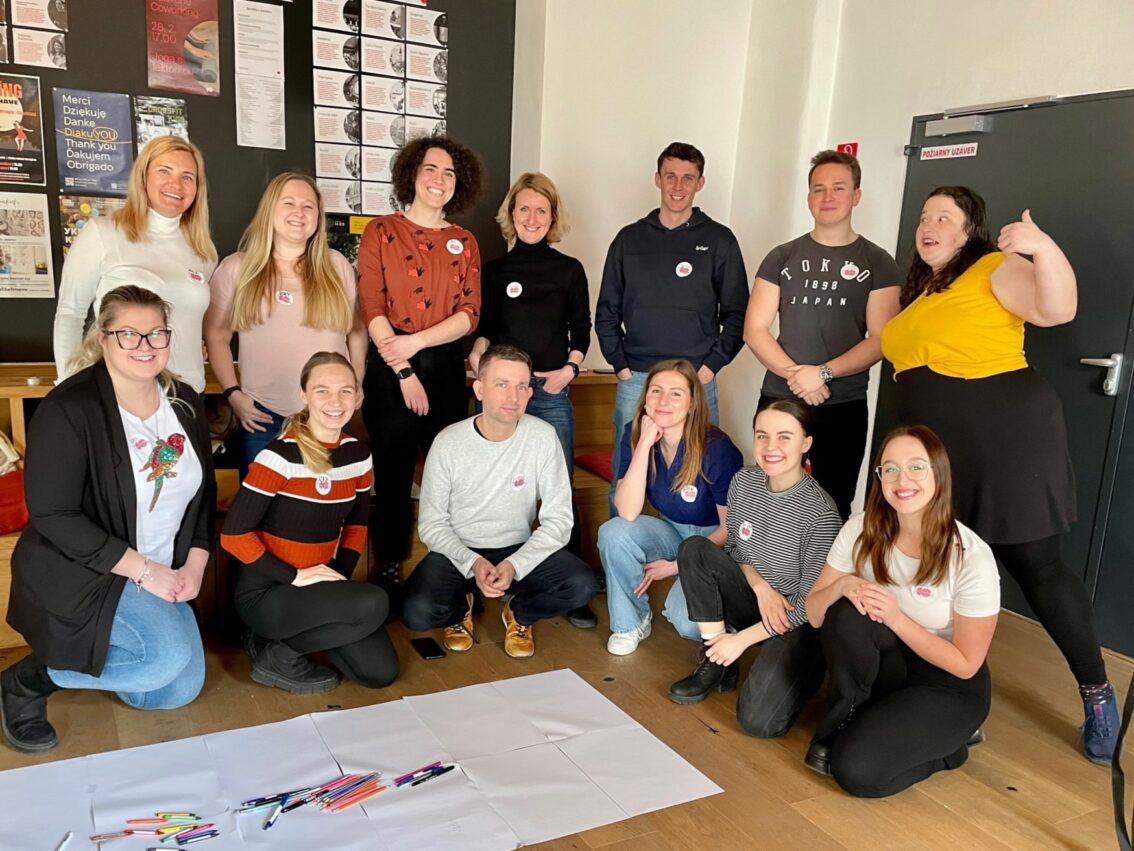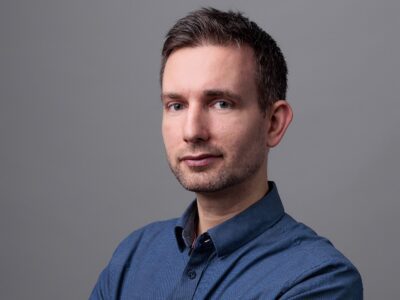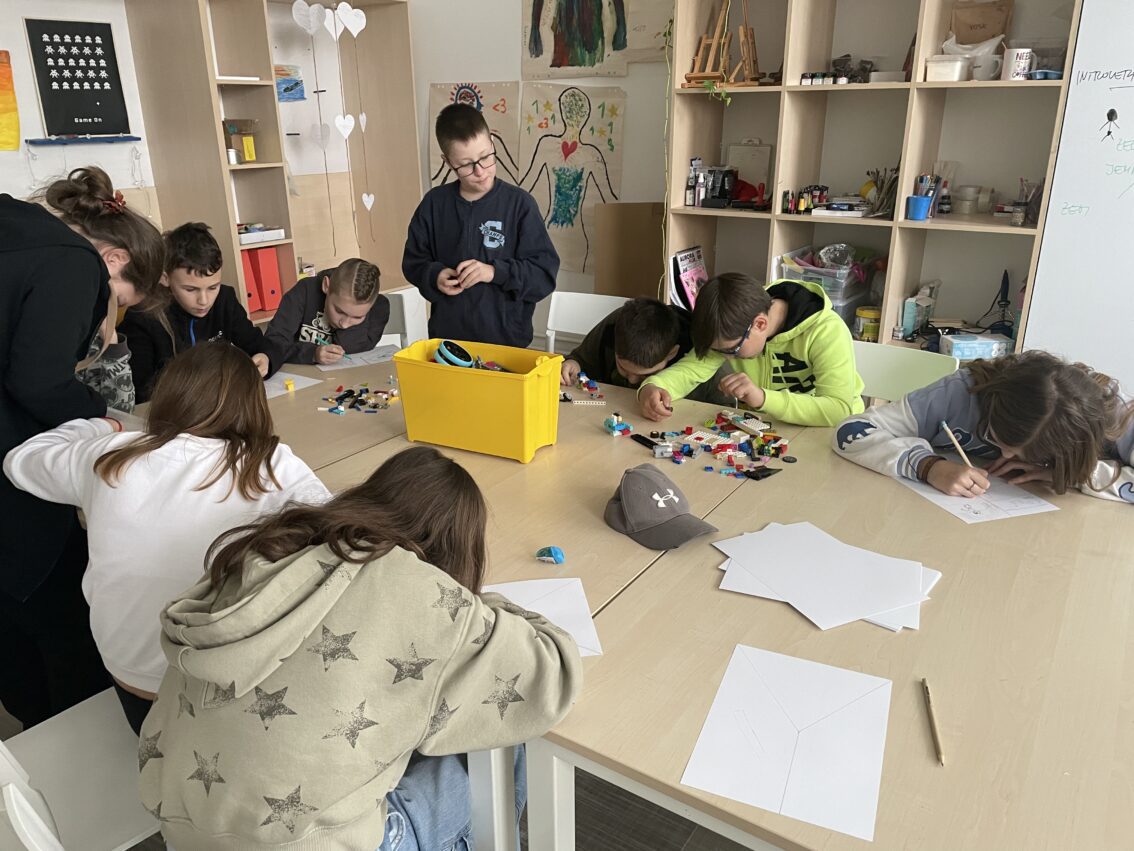Psychologist Viktor Križo: Taking Care of Ourselves Is the Key. If the Teacher Isn’t Okay, Kids Will Notice Quickly
Viktor Križo sees informal education for children aged 11 to 15 as highly useful and beneficial, not only for the children themselves but also for the adults working with them.
It’s a challenge, sometimes hard work, and it requires patience, but it’s worth it! We discussed issues in education in Slovakia, methods of conflict resolution, and the significance of informal education. The following interview was conducted as a part of our boot camp, where Viktor Križo from Inklucentrum served as a lecturer. He confirmed that developing soft skills can significantly help children later in life, remarking that companies don’t need people who can divide three-digit numbers, but those who can adapt to change and are flexible.
The Open Future program provides informal education for children aged 11 to 15, during the period of emerging adolescence. What do you see as the biggest challenges when working with this age group?
Anyone working with children at this age must at first be well-balanced themselves. Adolescents easily uncover everything dark and unresolved within a person. If I have a problem with noise or if I’m shy, these qualities will be fully exposed. I’ll be nervous, I’ll feel stressed. It’s essential to know oneself well and be able to prevent certain things.
Teachers, especially those at the middle schools, often burn out. They become numb towards children, automatically seeing them as criminals and troublemakers. They’ve forgotten to armor themselves. Working with children at this age is like going to war. You need to be strong and have enough weapons in a good sense of the word. You really need to know yourself well in the context of your relationships with children. Then a teacher can handle the stress, react in time, and not suppress so many things into the background. Otherwise, one goes home from the school or club feeling destroyed by the children and sleeps poorly.
On the other hand, if a person is well-grounded within themselves, they’ll find that working with young people at this age is extremely enriching. Working with youth is like being exposed to fire. You need to be firm. When the work is already destroying me, it’s important to have a mentor, supervision, so that one doesn’t burn out. Find your place, set your rules, and know how to take care of yourself – it’s like the oxygen mask on a plane that I put on first and then I’m able to help others.
In one of the interviews, you emphasized the benefits of morning circle sessions in teaching, as well as the importance of a simple “How are you?” question from the teacher. What is the hidden power of such elements in working with youth?
Since a teacher spends years with children, there’s a very close relationship between them. It doesn’t have to be just about asking “How are you?” because the teacher already sees many things. They can notice what’s happening in the class and bring it as a topic into the morning circle. For example: “Yesterday, I noticed that you had a hard day, you had more tests, so I wanted to hear how you handled it.” This sentence shows the teacher’s interest.
I can ask the question “How are you?” in a way that clearly shows I don’t care about the answer, that the question is one of many formal activities for me. I can, however, ask in a way that expresses deep interest. Once during a morning circle, I started talking about an event that happened at the Christmas markets in Berlin the day before. There was a terrorist attack where a man drove a car into a crowd of people. Many students caught this information in the evening news. I also brought pictures. I explained to the children that I was interested in how they perceived it. The goal wasn’t to solve the problem but to create interaction. Through a specific current topic, I initiated a debate. Together we experienced informality in that conversation, unlike in math where they open their workbooks and do calculations.
The time when a parent or a teacher talks to the child is genuine relationship-building. The child speaks about their experiences and listens about mine – the experience is mutual. That’s why schools should introduce more informal moments, for example, through morning circles. When there’s a conflict in the classroom, I won’t have the “sort it out with the class teacher later” approach. I can immediately react so that the children understand I’m interested and concerned about the situation.

Viktor Križo accepted an invitation as a lecturer at the Open Future Bootcamp, where he also spoke about non-violent communication and the right reaction to conflict situations.
Psychologists at schools should be the support for teachers and parents as well
So-called helping professions, such as psychologists, are becoming increasingly common at our primary and secondary schools. What is their greatest significance?
Before my stay in Norway, I thought helping professions existed to support children. When I experienced the Nordic countries, I understood that helping professions aren’t just for children; they may be even more critical for adults, for teachers, or parents. Teachers should be real relational figures for children, with whom they spend every day and form a community.
Creating external relationships between psychologists and children isn’t the ideal model. Psychologists at schools serve as supporting pillars that hold the building, but they’re not directly part of that building; their role is to make it work from the inside. In Slovakia, we need to move away from psychologists working with 23 children per week, with one child per hour. There are gaps here. If a psychologist or a psychotherapist has their office, sits there, and carries out their activities, it has the same effect as bringing loafs of bread to Africa and randomly handing them to children. This kind of approach doesn’t build a system, a safe environment.
Psychologists need to do more than just individual interventions with children. They should support teachers in making their assessments less stressful. They should also establish such a climate at schools where interpersonal relationships between the teaching community, the principal, or the director and the children are supportive.
In the curriculum of the Open Future program, we develop soft skills, entrepreneurial spirit, and digital skills in children at middle school. They present their own projects and learn to collaborate in teams. Our professional advisors have confirmed that these skills are lacking in students after completing primary school. How should we address this gap on a broader scale?
It would be great if programs like Open Future influenced education in our country. I find it important to influence the system through such programs. A school with an informal extracurricular program can gradually “infect” itself with this method of work in a good sense. It develops critical thinking in children. I think the state is currently cautiously working on this, but it lacks the know-how. Programs like Open Future have this know-how. Let’s not forget that companies don’t need people who can divide three-digit numbers. They need people who can respond to change, who are flexible.
This is something we don’t give to children at our schools. The entire teaching is planned from A to Z. There’s no room for anything to go wrong. Something always goes wrong anyway, and when it does, we don’t know how to react. We punish the student, give them a note, and move on. We don’t develop soft skills at all, yet these are what children will need in life and in business later.
How should teachers proceed in developing soft skills? It’s not always easy in the classroom; conflicts arise, sometimes you want to raise your voice.
It’s like teaching English. First, we go through grammar, we learn vocabulary within topics like family, transportation, the city, and others. But if children were to learn vocabulary, for example, from the cooking field by the teachers cooking with them for a week, they’d master it much more naturally. It’s the same with soft skills. Ideally, teachers or educators should adopt them through reflection or mentoring.
How does such learning look like?
First, I try to react to a specific situation that occurred with children. Maybe I won’t react entirely appropriately, but later, I’ll return to my reaction. I’ll reflect on what I said and did and how the children reacted to it; what they didn’t react well to in my behavior, what worked, on the other hand. I learn as I use the soft skills. We must work with feedback, try it, don’t be afraid of changes or failure. Maybe I’ll make a fool of myself, so what?
If I react terribly in a certain situation, I am not afraid to admit it in front of the children. For example, “I saw your reaction when I said this, you probably didn’t like it.” Sometimes, I say something artificial, and the child feels like we’re playing psychologist. It’s like developing a product in the corporate sector. At the end of the day, it’s not perfect. It’s about trying something, being curious about the feedback. We see how people react to the product and adjust to it accordingly.
Viktor Križo

He studied mathematics education, special education, theology, and psychology in Bratislava, Trnava, and Brno. As of this time, he’s also in PCA psychotherapeutic training. He spent twelve years as a math teacher and special educator. Currently, he works as a psychologist and therapist at the Counseling and Prevention Center in Bratislava 3.
He promotes the concept of inclusive education based on the humanistic psychology of freedom and responsibility of C. Rogers, Maslow, and the model of Nonviolent Communication. He guarantees innovative education at Inklucentrum and lectures on courses. In the Slovak Chamber of Teachers, he focuses on the democratization of schools.






